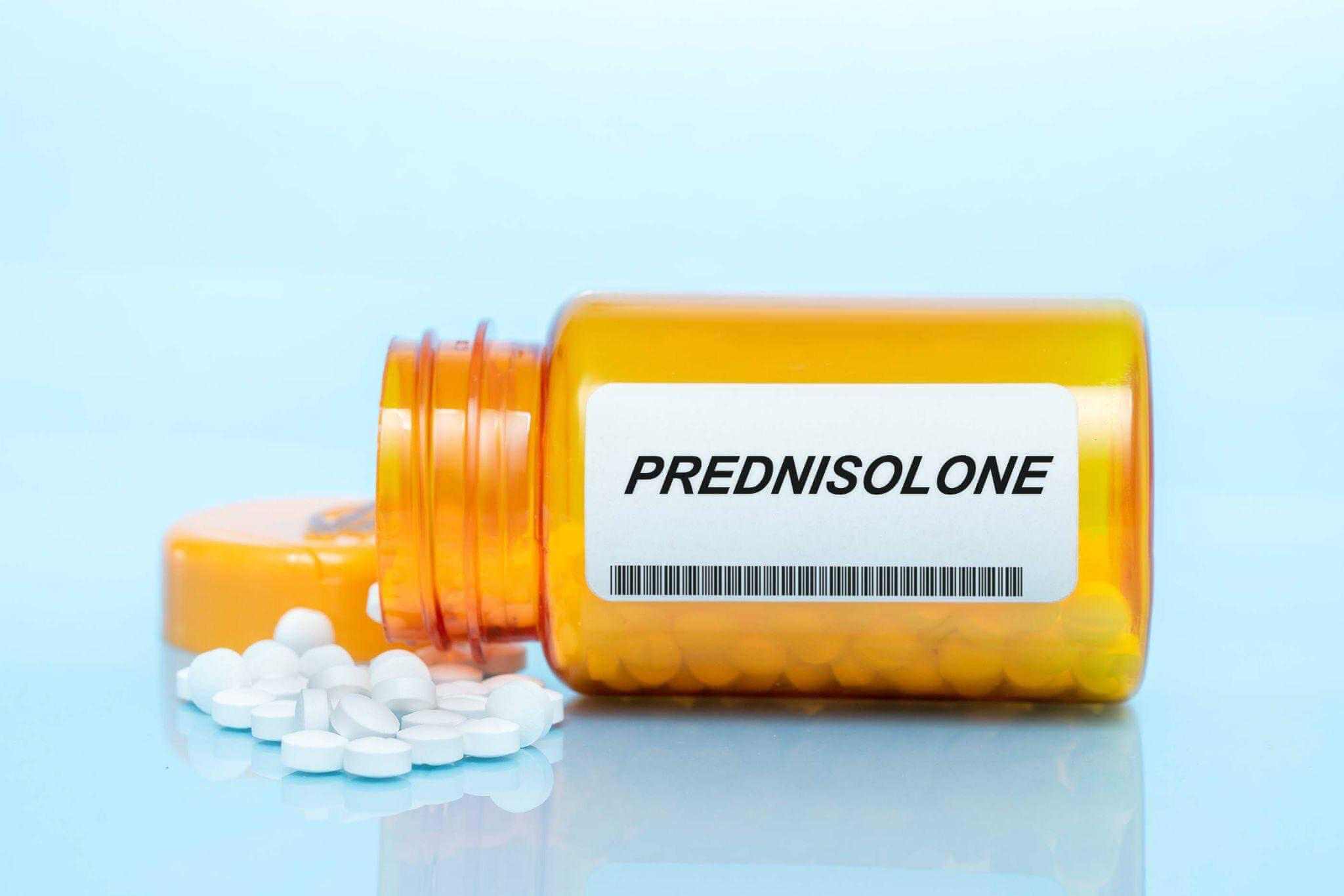Highlights
- Prednisolone, an active form of prednisone, is a synthetic glucocorticosteroid with anti-inflammatory and immunosuppressive properties. It works by mimicking cortisol, reducing inflammation, and suppressing immune responses, making it useful in treating a variety of conditions.
- Prednisolone is prescribed for a range of diseases, including hormonal disorders, inflammatory conditions like arthritis and lupus, allergic disorders, and certain types of cancer.
- Unlike prednisone, which requires liver conversion, prednisolone is directly usable by the body and has a higher bioavailability.
- While effective, prednisolone can cause numerous side effects ranging from mild to severe. It also has numerous potential drug interactions, highlighting the importance of discussing all medications and supplements with healthcare providers.
Prednisolone is a corticosteroid that limits the release of biochemical compounds that cause inflammation. In addition to reducing inflammation, it also helps rein in autoimmune responses. By mimicking the action of the hormone cortisol, prednisolone weakens the immune system, making those who take it more vulnerable to infections.
What Is Prednisolone and What Is It Used For?
As a potent synthetic corticosteroid, prednisolone suppresses inflammation and the immune system, fights allergies, and exhibits anti-shock action. It is the active form of prednisone.
It is a synthetic hormone that acts like cortisol, a natural hormone the adrenal gland secretes. It also reduces sodium secretion from the body, increases potassium retention, and raises glucose levels in the blood.
The History of Prednisolone
Prednisolone’s journey through discovery and development closely paralleled the advancements in the field of corticosteroids.
In the 1930s, scientists achieved a breakthrough by isolating the first corticosteroid. Building upon this discovery, the 1940s marked the introduction of the initial synthetic corticosteroids. Notably, in 1950, the pioneers behind the identification of adrenal gland hormones were honored with a Nobel Prize for their groundbreaking contributions.
Among these synthetic corticosteroids, prednisone emerged as the foremost discovery. Prednisone operates as a prodrug of prednisolone, meaning it’s inactive on its own; the liver metabolizes it into prednisolone, its active state.
Because of its potent anti-inflammatory and immunosuppressive properties, prednisolone began making its mark in the medical field in the late 1950s. Since then, pharmacists have fine-tuned various formulations of the drug, making it an important treatment for conditions such as inflammation, autoimmune disorders, allergies, and more.
The Food and Drug Administration (FDA) approved prednisolone in 1955. Today, researchers still study prednisolone and continue to find new applications for the drug.
Prednisolone’s Uses
Its multi-pronged action makes prednisolone suitable for the treatment of a wide range of conditions, including:
- Hormonal disorders
- Inflammatory conditions like psoriasis, lupus, arthritis, and ulcerative colitis
- Allergic disorders
- Dermatologic problems
- Gastrointestinal diseases
- Kidney problems
- Lung diseases
- Eye problems
- Problems of the nervous system
- Some infectious diseases
- Some nervous system conditions
- Some types of cancer
Doctors may also prescribe prednisolone for many off-label uses, like severe allergic reactions, chronic cough, and some blood disorders.
Prednisolone is a generic drug available under many brand names, including:
- Orapred ODT
- Omnipred
- Millipred
- Prelone
- Pred Forte
- Pred Mild
- Veripred
- Cotolone
- Hydeltrasol
- Predicort
Prednisolone vs. Prednisone
Prednisone is a prodrug that the liver turns into prednisolone. Yet, the two compounds differ in many ways.
Their chemical structures are different. Unlike prednisone, the body can use prednisolone directly, without conversion by the liver.
Prednisolone has a higher bioavailability than prednisone and may, therefore, be more “potent.”
Read Prednisone vs. Prednisolone: What’s the Difference? to learn more about the differences between the two medications.
How Does Prednisolone Work?
As a glucocorticosteroid, prednisolone works by blocking the activity of some immune cells like white blood cells and macrophages. Immune cells play significant roles in inflammatory responses. The suppression of the immune system happens by the same mechanism.
In addition to immune cells, prednisolone also inhibits cytokines. Cytokines are microscopic proteins that message immune cells and control their growth and activity.
In addition to its anti-inflammatory and immunosuppressive effects, prednisolone can also fight edema (swelling). It decreases the permeability of the blood vessel walls, making it more difficult for fluids to accumulate in tissues.
Prednisolone also stabilizes cell walls by making them less permeable.
Unfortunately, because of its interference with inflammatory and immune reactions on such deep levels, prednisolone can cause some undesirable side effects.
What Formulas Are Available for Prednisolone?

Prednisolone is available in a wide range of formulas to treat diverse conditions.
In oral tablet form, it comes in 1 milligram, 2.5 milligram, 5 milligram, 10 milligram, 20 milligram, and 50 milligram doses.
Prednisolone is also available in 15 milligram/5 milliliters syrup and 1% eye drop forms.
Other prednisolone formulas are:
- Oral suspension
- Oral liquid
- Oral disintegrating tablets
- Injectable solution
- Compounding powder
Prednisolone Dosage and Administration
Because of the wide variety of conditions that may be treated with prednisolone, there are no standard dosage guidelines. Doctors determine dosage based on the condition being treated, the patient’s age and medical history, and other factors.
How Should I Take Prednisolone?

Guidelines vary, based on the form of prednisolone you’re taking. Below are general guidelines:
- Always take this drug exactly as your doctor prescribes it. Depending on your response to the treatment, your doctor may tweak your dosage. Always take care to update your routine and take only the prescribed doses. Be aware that in some cases, the treatment regimen is every other day.
- Follow the instructions on your medicine label. If your oral suspension requires you to shake up the liquid before you measure a dose, do so.
- Take special care with disintegrating tablets. Don’t remove them from the blister pack until you’re ready to take them. Peel back the foil gently instead of pushing the tablet through it.
- Don’t chew disintegrating tablets. Allow them to dissolve in your mouth and swallow several times before you eat or drink anything else.
- Measure carefully. Always use a special dose-measuring syringe, cup, or spoon for measuring doses of liquid prednisolone medication.
- Don’t stop taking prednisolone suddenly. You must taper the dose. Only your doctors can tell you how to do that and when to discontinue taking the drug.
- Consider wearing a medical tag. Prednisolone has a profound effect on the body, influencing its hormonal functions. It can also interact with other medications. If you’re taking prednisolone, it’s wise to wear a medical tag identifying you as a patient under prednisolone treatment.
- Follow surgical precautions. If you need surgery, you may have to stop taking prednisolone for a while. Ask your doctor for instructions on how to stop and restart your treatment.
What Are the Potential Side Effects of Prednisolone?

Prednisolone can have many side effects, some of them potentially life-threatening, and it can trigger allergic reactions.
If you have an allergic reaction, you need emergency medical help. Some symptoms of an allergic reaction are:
- Hives
- Swollen face, throat, or mouth
- Difficulty breathing
- Itchy and irritated eyes
Left unaddressed, allergic reactions can be fatal.
Prednisolone can have other severe side effect, including:
- Cushing’s syndrome
- Rapid weight gain
- Swelling in various body parts
- Exhaustion and shortness of breath, even with mild physical efforts
- Difficult or rattling breathing
- Significantly less urination
- Irregular heartbeats, palpitations
- Unusual pain in the arms, neck, or back
- Tarry, bloody stools
- Seizures
- Severe upper-stomach pain and vomiting
- Personality changes, mood swings, and unusual thoughts
- Severe depression
- Vomit that looks like ground coffee
- Signs of low potassium levels, including unusual thirst and abundant urination, cramping legs, fluttering in the chest, tingling or numbness in the extremities, constipation
Seek medical help if you experience even one of these symptoms. Some of the more common side effects that may warrant medical attention are:
- Dizziness
- Headache
- Irritability
- Aggression
- Having trouble walking, speaking, and thinking
- Blurred vision
- Skin rashes
- Abdominal cramping
- Slow healing
- Chills and fever
- Pain in the eyes
- Fruity breath odor
- Muscle loss
- Loss of libido
- Menstrual problems
- Height decrease
- Deteriorating vision
Some of the most common side effects of the drug may not require immediate medical attention unless they take a turn for the worse.
- Thinning scalp hair
- Dry scalp
- Increased appetite
- Swelling of the stomach
- Unusual fat deposits on the face or neck
- Purple or reddish lines on various body parts
Side-effect lists are never complete. Drugs like prednisolone may cause other side effects, depending on how each person reacts to it. Do not hesitate to contact your doctor if you are worried about the side effects you experience.
What Should I Avoid When Taking Prednisolone?
Prednisolone affects how your immune system works. It reduces the ability of your body to fight infections. When you’re on prednisolone, try to avoid sick people and situations where you may contract an infection. If you come in contact with people with chickenpox or measles infections, talk to your doctor and seek preventive treatment.
 Avoid infected people.
Avoid infected people.
Do not get live vaccines — those that contain weakened or inactive versions of viruses or bacteria. Live vaccines include influenza, shingles, chickenpox, rotavirus, rubella, and mumps vaccines, among others.
If you get a live vaccine while on prednisolone, it will likely not be as effective as it should be. Live vaccines use weakened versions of the germs and viruses against which they provide protection.
Avoid smallpox vaccines. You can develop severe complications if you get a smallpox vaccine while under treatment with prednisolone.
What Should I Do If I Miss a Dose of Prednisolone?
Never double-dose prednisolone. If you forget to take a dose, take it as soon as you remember it unless it is almost time for your next dose. In that case, skip it.
It’s not a bad idea to call your doctor if you miss a dose. Your particular situation may require a different approach.
What Should I Do If I Overdose on Prednisolone?
Overdosing on prednisolone should not result in life-threatening symptoms and side effects. If you happen to overdose, however, call the Poison Help line at 1-800-222-1222.
Symptoms of overdose may include:
- Erectile dysfunction
- Loss of interest in sex
- Mood swings
- Thinning skin
- Easy bruising
- Altered body fat distribution
- Acne
- Growth of facial hair in women
Warnings and Precautions
Some people can’t take this drug at all. For others, doctors must weigh its likely benefits against the potential side effects and harm it may cause.
Who Should Not Take Prednisolone?
Don’t take prednisolone if you’re allergic to it. Your doctor will probably not prescribe this drug for you if you have a systemic fungal infection. (This does not apply to a local infection, such as athlete’s foot.)
Always talk to your doctor about all medications, supplements, and vitamins you take.
Who Should Take Prednisolone With Caution?
Your doctor may not recommend prednisolone if you have an eye infection or have had trouble with a reoccurring form of your condition.
Also, tell your doctor if you suffer from any of the following conditions:
- Glaucoma
- Cataracts
- Cushing’s syndrome
- Uncontrolled high blood pressure
- Diabetes
- Tuberculosis
- Thyroid or kidney disease
- Liver disease
- Heart disease
We don’t know whether prednisolone can harm an unborn or nursing baby, so it’s best to exercise caution if you’re pregnant or breast-feeding.
Are There Any Other Potential Drug Interactions With Prednisolone?
According to drugs.com, a total of 578 drugs can interact with prednisolone.
Of these, 71 are major interactions, 466 are moderate, and 41 are minor.
For the complete interactions list, check the Drugs.com Prednisolone Interactions Checker.
No list of potential drug interactions is complete, so let your healthcare provider know if you experience any new or unusual symptoms after taking this medication.
Conclusion/Transition Section
Prednisolone is a powerful medication used to treat many diseases and conditions. It’s important to understand how it works, the side effects it may cause, and how it interacts with drugs, foods, and other health conditions.
Now that you have educated yourself about prednisolone, it’s time to find out how to get it at the lowest price.
Get the Lowest Price for Prednisolone With BidRx

BidRx allows you to create bids for the medications you need. When you create your bid for prednisolone, pharmacies compete to fill your prescription by giving you their lowest price for prednisolone.
You choose your offer, then have your prescription delivered to your home or, depending on the offer you choose, pick it up at a local pharmacy.
Please note that this information is intended for general informational purposes only. It is not a substitute for professional medical advice, diagnosis, or treatment. Always seek the advice of your physician or other qualified health provider with any questions you may have regarding a medical condition or medication.
